Posts Tagged ‘Leadership’
149 What 9/11 Taught Us About Leadership w/ Chris Fussell Navy Seal & President McChrystal Group
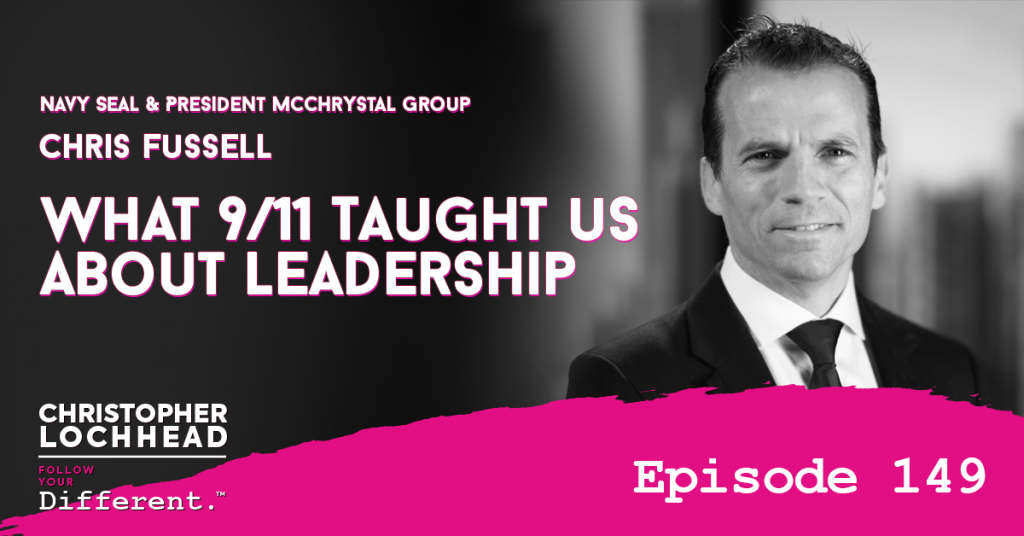
Podcast: Play in new window | Download (Duration: 59:59 — 41.2MB) | Embed
Subscribe: Apple Podcasts | Spotify | Pandora | RSS | More
Today, we have a very timely conversation about leadership and crisis management with a highly decorated Navy Seal Chris Fussell. He partnered with 4-star General Stanley McCrystal to retool the US military after 9/11. Chris is a legendary American hero, a servant leader in the military, entrepreneur, and now the President of McCrystal Group.
Chris and Stan consult and advise organizations around the world on leadership and frankly, they helped a lot of organizations deal with this crisis. We also talk about a recent opinion piece that Chris and Stan wrote for the NY Times.
Connected Through Structure
Chris describes that tribes are connected through structure and leadership. It also holds true within industries. He further shares that when the ability of those systems starts to be dismantled through the separation physically or something similar to what is happening to us at the moment, we will end up with a disconnected state.
He further shares how this scenario in relation to them at Washington DC/ Since there is a “disconnected state” the food shortages among families on the other side of DC do not affect Capitol Hill emotionally. He says this is how inequity stats.
Social Cohesion
Chris shares that the “fabric” that holds society together is immediate family, community and socioeconomic circles.
“This is critical that we reach across those boundaries that’s why, institutions—like a workplace that pulls from many different networks, from the executive, down to the frontline folks, or like a public school or a church, that reaches across the boundaries—those create this fabric that pulls us together anytime you see that disrupted at scale for an extended period. If the fabric is unwoven, its really hard to weave them together.” – Chris Fussell
Call For National Level Campaign
Chris took the opportunity to call everyone to action to help out in any way they can. Christopher Lochhead shared that he and his family purchased plastic gloves from a local restaurant supplier and dropped it to local hospitals in Santa Cruz.
“The people at the bottom are those who are gonna suffer more economically. They’re gonna suffer the worst medically as a result of this pandemic. The economically deprived neighborhoods.” – Chris Fussell
To hear more about Chris and how leaders are holding up with this crisis, download and listen to this episode.
Bio:
Chris Fussell is the President of McChrystal Group.
He is an author of the 2015 New York Times bestseller, Team of Teams: New Rules of Engagement for a Complex World as well as 2017 Wall Street Journal bestseller, One Mission: How Leaders Build a Team of Teams.
He joined McChrystal Group as a Partner in 2012.
Chris was commissioned as an Officer in the United States Navy in 1997, and spent the next 15 years on US Navy SEAL Teams, leading SEAL elements in combat zones around the globe.
From war-torn Kosovo, to counter-terrorism operations in Iraq and Afghanistan, to highly specialized efforts in the troubled areas of the Arabian Peninsula and North Africa, he experienced and led through the modern evolution of the US military’s Special Operations community, first on SEAL Teams Two and Eight, then in the Naval Special Warfare Development Group.
Chris was selected to serve as Aide-de-Camp to then-Lieutenant General Stanley McChrystal during General McChrystal’s final year commanding the Joint Special Operations Command (JSOC), where they served for a year together in Iraq.
He witnessed first-hand the Special Operations community’s transformation into a successful, agile network.
Chris is also a Senior Fellow for National Security at New America, a Washington, DC-based non-partisan think tank dedicated to understanding the next generation of challenges facing the United States.
Chris is actively involved in several non-profits dedicated to helping veterans and their families, and holds a seat on the Board of Directors for the Navy SEAL Foundation. He is also a lifetime member to the Council on Foreign Relations.
Chris earned a Master of Arts in Irregular Warfare from the Naval Postgraduate School, receiving the Pat Tillman Award for highest peer-rated Special Operations Officer in the program.
His thesis work focused on the interagency collaboration and intelligence sharing processes that drove effective, cross-silo collaboration during the peak of the wars in Iraq and Afghanistan.
Links:
Christopher Fussell – McCrystalGroup
Linkedin – Christopher Fussell
New York Times – What 9/11 Taught Us About Leadership in a Crisis
We hope you enjoyed this episode of Follow Your Different™! Christopher loves hearing from his listeners. Feel free to email him, connect on Facebook, Twitter, Instagram and subscribe on iTunes!
034 Digital Leadership & Why Leaders Over-Communicate
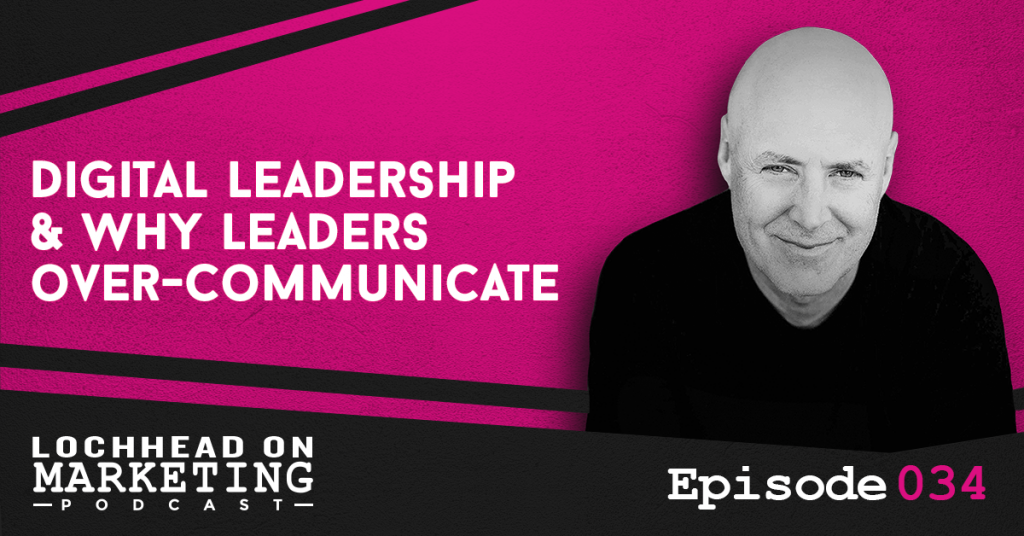
Podcast (lochheadonmarketing): Play in new window | Download (Duration: 10:45 — 7.4MB) | Embed
Subscribe: Apple Podcasts | Spotify | RSS | More
Extraordinary times call for legendary leadership. Because of the Coronavirus, shit is getting very weird. As Hunter Thompson said, “When the going gets weird, the weird turns pro” which is why it’s time to become a Digital Leader and over-communicate.
Primary Mode of Communication
In times of crisis, people need to both see and hear from their leaders. Former navy seal and former Chief of Staff for 4-star General Stanley McCrystal, Chris Fussell was on FYD episode 38 and he made a comment on digital leadership in an article he wrote on NY Times.
He made a comment on “digital leadership and said “first, don’t hunker down. Second, demonstrate candor.” Christopher thinks this is good advice especially in times like this, the only way people are experiencing their leaders is digital.
“Going forward once we get through this crisis, it is very clear, digital communication will become, if it is not already, the primary way that your employees hear from you and see you.” – Christopher Lochhead
Leaders Are Not Overcommunicating
Christopher observed that CEOs, CMOs or any business leaders at the moment are not communicating much. This to him is a big mistake. He shares that Fussel and McCrystal are right on, from a tactical point of view. He also encourages leaders, not only to improve public speaking skills but to get comfortable with technology such as Zoom.
“I don’t think you can be a leader anymore unless you’re a digital leader.” – Christopher Lochhead
To cite an example, Chris Fussel talked about McChrystal doing daily briefings. He couldn’t take a top-down approach on communications that he needed to be front and center with all of his people and so he started daily briefings using video and audio.
Becoming a Digital Leader
As a CEO, CMO, of business leader the first a-ha here is that you can’t be a leader unless you’re a digital leader. Since its the only way for people to experience you, you must get comfortable with technology. Make the necessary upgrades on your hardware such as microphone, camera, among others.
Consider having daily CEO briefings. Learn how to motivate your employees and ask the tough questions. Be radically candid and keep in mind, LISTEN, LISTEN, LISTEN.
To hear more about Christopher’s thoughts digital leadership and overcommunicating. download and listen to this episode.
Bio:
Christopher Lochhead is a #1 Apple podcaster and #1 Amazon bestselling co-author of books: Niche Down and Play Bigger.
He has been an advisor to over 50 venture-backed startups; a former three-time Silicon Valley public company CMO and an entrepreneur.
Furthermore, he has been called “one of the best minds in marketing” by The Marketing Journal, a “Human Exclamation Point” by Fast Company, a “quasar” by NBA legend Bill Walton and “off-putting to some” by The Economist.
In addition, he served as a chief marketing officer of software juggernaut Mercury Interactive. Hewlett-Packard acquired the company in 2006, for $4.5 billion.
He also co-founded the marketing consulting firm LOCHHEAD; was the founding CMO of Internet consulting firm Scient, and served as head of marketing at the CRM software firm Vantive.
Links:
What 9/11 Taught Us About Leadership in a Crisis, NY Times
Using the Next Recession to Change the Game
How to Survive a Recession and Thrive Afterward, HBR
Seize Advantage in a Downturn, HBR
Advantage In Adversity: Winning The Next Downturn
We hope you enjoyed this episode of Lochhead on Marketing™! Christopher loves hearing from his listeners. Feel free to email him, connect on Facebook, Twitter, Instagram and subscribe on iTunes! You may also subscribe to his newsletter, The Difference, for some amazing content.
139 World Without Waste w/ Steve Pratt CEO of AI Startup Noodle
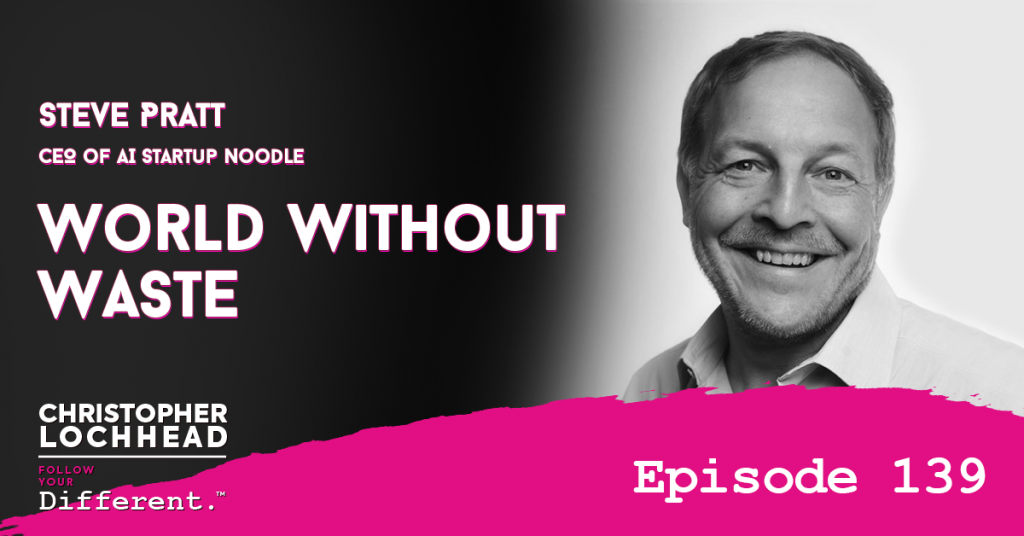
Podcast: Play in new window | Download (Duration: 59:58 — 82.7MB) | Embed
Subscribe: Apple Podcasts | Spotify | Pandora | RSS | More
This is our second in our two-part series on Digital Business, with Steve Pratt, CEO of Noodle.AI, the remarkable startup on a mission to changing global manufacturing and supply chain business.
We have a real conversation about how the combination of Machine Learning / AI, The Cloud, IoT and deep data analytics can come together to reduce both economic and environmental waste.
In case you missed the first part of this two-part series with Business Guru Big Ben Rewis, check it out: Episode 138.
Missionary CEO
Christopher has known Steve for over 30 years. He has a vast and impressive experience in digital marketing, starting with the creation of CRM business for Deloitte. He was also the founder and CEO of the InfoSys Consulting Practice and he also led IBM Watson’s initiatives.
Steve has deep experience in building and managing massively successful, deep technology businesses. He has some powerful insights, through his company Noodle.Ai, into how modern technology can reduce economic and environmental waste. This is what Christopher calls a great example of a missionary CEO, where the E stands for Evangelist.
“The intention of the company is to apply data science to create a world without waste. We reject this notion, historically, that you had to choose between profits and the planet.” – Steve Pratt
World Without Waste
Steve shares how companies have scaled things right now. They have created amazing hyper-growth for their companies, but have also accumulated huge amounts of waste.
“We have over 500 billion dollars of excess inventories sitting in warehouses. We got 50% of trucks driving around, empty. We have about 400B dollar of stuff, that is thrown out in the manufacturing process because of quality defects. These are all preventable.” – Steve Pratt
A lot of people analyzed where the waste is in the world and over 90% of the waste in the world is due to manufacturing and logistics. Steve points out that due to bad computations, companies are manufacturing trillion dollars of goods and let it sit in their storage, because they couldnt get it out to the market.
Environmental Sustainability
Steve shares about steel manufacturing company Big River Steel, which they granted a lead certification for environment sustainability.
“With our applications, that consumption to reduce inventory levels, reduce quality defects and they are the most profitable, per employee, the highest profit per mil hour, the lowest environmental impact of any steel known in the world.” – Steve Pratt
Christopher and Steve then discussed that companies should analyze data that is readily available to them. This is can easily be achieved through the help of various technologies available.
To hear more about how digital businesses can achieve a world without waste and other insights of Steve, download and listen to this episode.
Bio:
Stephen is an instigator, agitator, and pioneer in creating world-class technology services organizations.
He has spent his career building innovative ways to create value for the world’s most important organizations.
Prior to Noodle, he was responsible for all Watson implementations worldwide for IBM Global Business Services.
He also was the founder and CEO of Infosys Consulting, a Senior Partner at Deloitte Consulting, and a technology and strategy consultant at Booz, Allen & Hamilton.
He twice has been selected as one of the top 25 consultants in the world by Consulting Magazine.
He has Bachelors and Masters degrees in Electrical Engineering from Northwestern University and The George Washington University focused on Satellite Communications.
For fun, Steve plays competitive tennis, races sailboats, and formerly was a crazed rugby player. He enjoys playing acoustic guitar for his children (not ready for prime time).
Links:
We hope you enjoyed this episode of Follow Your Different™! Christopher loves hearing from his listeners. Feel free to email him, connect on Facebook, Twitter, Instagram and subscribe on iTunes!
138 Digital Business Guru Big Ben Rewis
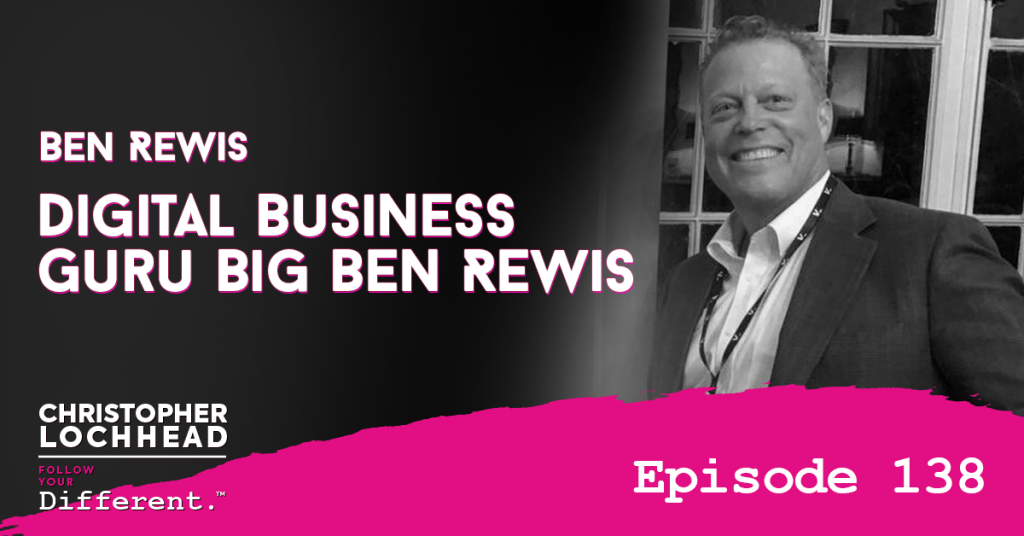
Podcast: Play in new window | Download (Duration: 1:05:16 — 149.7MB) | Embed
Subscribe: Apple Podcasts | Spotify | Pandora | RSS | More
This is our first in a special two-part series on Digital Business. The legendary Big Ben Rewis joins us today to have a real, powerful conversation about digital businesses today and how big data can contribute to sustainability.
In our next episode, watch out for Steve Pratt CEO of Noodle.AI, the remarkable startup changing global supply chains.
Surfer, Snowboard, Advisor
Big Ben is one of the most extraordinary adventure athlete’s of this time. He is a skier, snowboarder, sailor, and surfer. In fact, one of his first few sponsors were Jake Burton, the founder of Burton Snowboards.
Today, when he’s not surfing or on some kind of adventure, Ben Rewis would most likely be dishing digital business advice to Fortune 100 companies and startups in Silicon Valley. He has deep experience in building and managing massively scalable digital business and payments infrastructure.
Digital Business Guru
Just to name a few of Ben’s contributions, he created the Internet e-Commerce team for Visa. He was also Head of Security & Fraud Technology for First Data and he’s an advisor to a startup Verdant Robotics, a startup doing amazing things with AI & Machine Learning in the smart agriculture category.
“I think there’s a lot of themes, there’s a lot of organizational and technical similarity across all of them. The whole notion of data in the digital business is just fascinating, what’s happening in the industry today. Cause you know, like the industry quote ‘software is eating the world.’” – Ben Rewis
Digital Business is the Future
Digital businesses are not brand new, as they have been around a long time.Ben now shares that people are realizing the by-product of their digital business can infect more businesses.
“Digital businesses don’t necessarily have new value-added services that are data-based. They may have a legacy product or service, that is digital and they realizing that the data that is produced by that service can help them generate new revenues, or cut costs.” – Ben Rewis
To hear more about how digital businesses can greatly influence sustainability efforts for the future and other insights of Ben, download and listen to this episode.
Bio:
Ben Rewis was raised in New England north of Boston, the eldest son of two high school teachers.
After graduation from The Stowe School in VT., he moved to San Francisco, CA at age 17 and have been in technology ever since.
Today, he’s an advisory consultant to startup CEOs, and a deep payments expert with solid leadership and innovation skills.
Facilitator, speaker, communicator, thinker and doer, able to bring different constituencies together around a common digital business vision and set of deliverables.
Able to drive from big picture down to concrete initiatives. Passionate about helping teams solve challenges for strategic alignment.
In addition to his business involvement with major companies, he has decades of wilderness and group leadership experience, becoming an Outward Bound instructor at age 21, and taking part in numerous adventure expeditions around the world.
He’s crossed deserts and canyons, sailed the Tasman Sea, and climbed mountains like McKinley.
He enjoys just about all board sports, competed in the first world championships for snowboarding, and learned to surf at age 40.
Ben co-founded the Drop In Coalition, and is an Advisory Board Member of the Save The Waves Coalition, and was honored in 2019 as a Royal Geographic Society Fellow.
Links:
We hope you enjoyed this episode of Follow Your Different™! Christopher loves hearing from his listeners. Feel free to email him, connect on Facebook, Twitter, Instagram and subscribe on iTunes!
131 How to Build Billion Dollar Startups w/ David Sacks
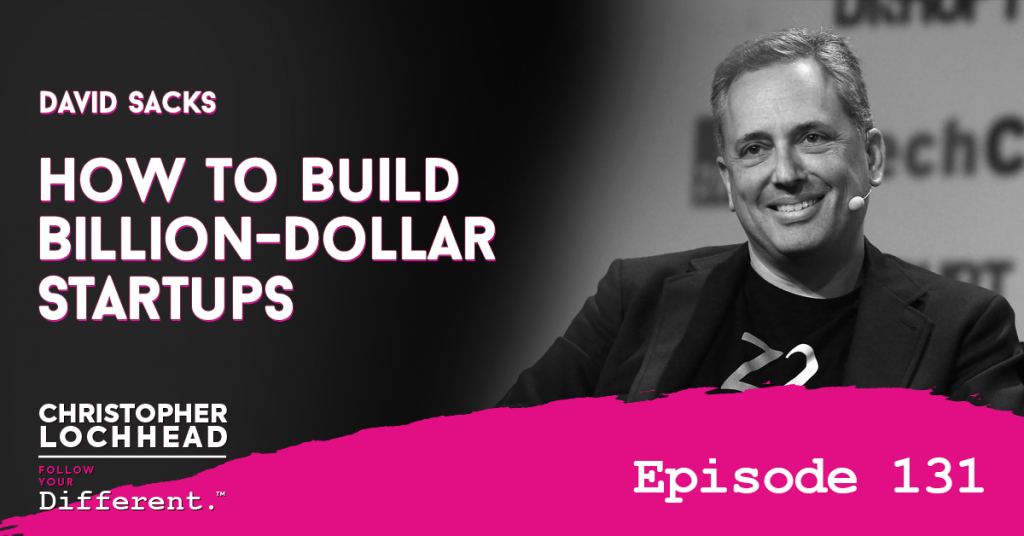
Podcast: Play in new window | Download (Duration: 1:00:03 — 82.7MB) | Embed
Subscribe: Apple Podcasts | Spotify | Pandora | RSS | More
In this episode, we have a real conversation about legendary entrepreneurs and investor David Sacks about how to build billion-dollar startups.
We talk about how startups go off the rails and what is ok and not ok to lose money on. We also touch on why B2C strategies have become powerful for B2B companies and many more! If you’re an executive or an entrepreneur, even if you’re outside of tech, get your pen ready. there’s a ton on this episode!
Legendary VC
We continue our run of legendary VCsc with David Sacks. He was a co-founder of PayPal, Founder, and CEO of Yammer and Founder of Craft Ventures. Some of his investments include Facebook, Uber, SpaceX, Palantir Technologies, Airbnb and Bird
This is another great example of the power of a real dialogue podcast.
“You know the old line of ‘nobody ever got fired for buying IBM’? I think that the modern version of that saying would be ‘no one ever got fired for buying the category leader’ and if you become the category leader, you just get all these sales by default.” – David Sacks
Going Off The Rails
David shares how he witnessed high profile companies going off the rails for several reasons. He noted that aside from product-market fit, there are other mundane reasons why these companies fail. Here’s the big list that could go wrong in high growth companies:
“One is commoditization, the rest of the world catches up the startups innovation. Two, cost of customer acquisition, a bunch of reasons it could happen. Third, margin problem, negative gross margins. Fourth, external dependency. Fifth, leaky bucket, there’s a problem with retaining customers. Sixth, regulatory compliance, then, sales compliance problem, that’s seven. Eight, doing things that don’t scale. Nine would be the founder psychology problem which is pushing things too far and tenth, company culture problem. One the 10.1 mark, macro shock where the company goes out for financing and isn’t able to raise around because of one of the problems I mentioned in them. Everything comes to head and you had a car crash.” – David Sacks
The Challenge for Startups
One of the greatest fears of startups Is commoditization. David says there is always a risk of the competition catching up in terms of software design. He encourages startups that it is a trade-off to make, to move fast enough to maintain market leadership.
“Everyone is running around with their hair on fire but they’re afraid that their innovation gets copied. If you’re not moving fast enough, you’re on a bit of hamster wheel. If you’re not moving fast enough, you’re running in place.” – David Sacks
To hear about David’s thoughts on how to define and dominate a market category, what areas of technology David thinks have the most promise and more, download and listen to this episode.
Bio:
David Sacks is a highly accomplished entrepreneur and investor in internet technology firms.
He is general partner of Craft Ventures, a venture capital fund he co-founded in late 2017. Previously as an entrepreneur, Sacks was the founding COO and product leader of PayPal (acquired by eBay in 2002 for $1.5 billion) and Founder/CEO of Yammer (acquired by Microsoft in 2012 for $1.2 billion).
In 2016, he led the turnaround of Zenefits as interim CEO.
In 2017, Sacks co-founded blockchain startup Harbor as an incubation of Craft Ventures.
His angel investments include Facebook, Uber, SpaceX, Palantir Technologies, Airbnb and Houzz.
Links:
We hope you enjoyed this episode of Follow Your Different™! Christopher loves hearing from his listeners. Feel free to email him, connect on Facebook, Twitter, Instagram and subscribe on iTunes!
029 Disagree and Commit
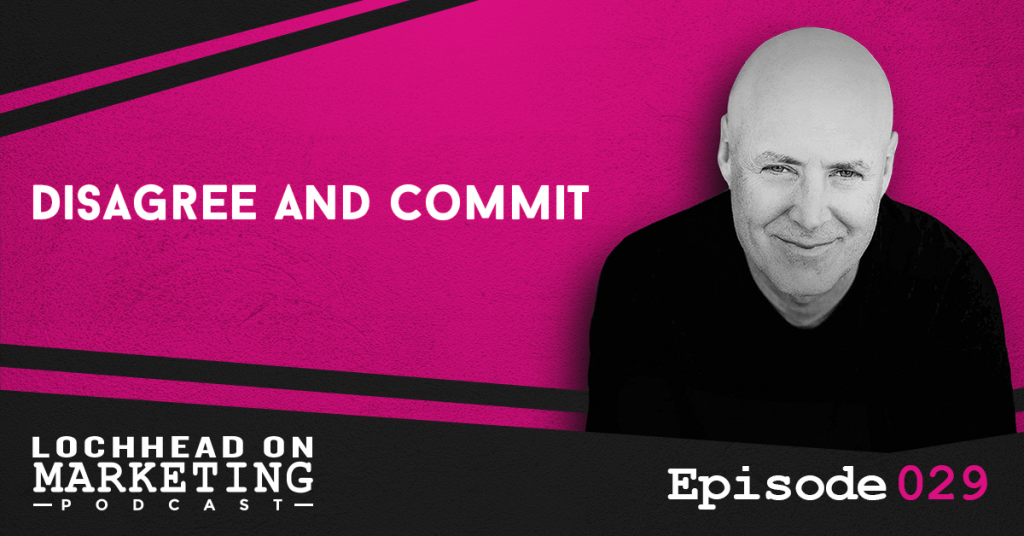
Podcast (lochheadonmarketing): Play in new window | Download (Duration: 10:06 — 13.9MB) | Embed
Subscribe: Apple Podcasts | Spotify | RSS | More
Every big decision involves a group of people.and so, in business, if you’re going to do something legendary, whether its a strategy or a campaign, it will be a group decision.
In this episode, Christopher Lochhead shares why it is a legendary business trait to be able to get people to disagree and commit.
Everybody has a Marketing Opinion
Recently, Christopher had a discussion on with legendary tech executive Elisa Steele on Follow Your Different Episode 129. She talks about the power of being able to disagree and commit. She also talks about the importance of being a consensus builder.
“Getting people to disagree and commit is one of the most important skills an executive can have. Why? Because everyone has a Marketing Opinion.” – Christopher Lochhead
CMO’s get a lot of “HELP” from internal stakeholders. Debate, discussion, and disagreement are GOOD, when you are working on strategies, creative ideas, campaign ideas or category design. However, consensus is BAD.
“If everyone agrees, by definition it sucks. If someone isn’t scared, upset or at least concerned, it’s probably not legendary.” – Christopher Lochhead
How Do You Get In Front of This
Christopher advises that from the 1st meeting, tell the people involved the following:
1) we want to do something legendary
2) we want to generate legendary ideas/creative “ideation stage”
3) and when we decide, we are going to execute like “a pack of speedy, crazed wolverines:”
It is essential to lay upfront during the first meeting that the objective is not to please everybody but to create a strategic desition that will reap legendary results. It is also important to address who is the final decision maker.
Strategic Decision Over Consensus
Addressing these concerns from the very beginning will definitely receive negative responses from a lot of people, including some board members or senior executives. Christopher says that “this is okay.” We are aiming for strategic decisions, not consensus.
It would be nice to acknowledge that businesses need “feedback.” However, it would also be better to get everyone’s commitment that they will support and execute the final strategic decision. Be firm on expecting everybody to commit, even if they hate the decision or the direction taken. This trait would separate legendary leaders from the ordinary ones.
To hear more about why it is a legendary trait to learn how to disagree and commit, download and listen to the episode.
Bio:
Christopher Lochhead is a #1 Apple podcaster and #1 Amazon bestselling co-author of books: Niche Down and Play Bigger.
He has been an advisor to over 50 venture-backed startups; a former three-time Silicon Valley public company CMO and an entrepreneur.
Furthermore, he has been called “one of the best minds in marketing” by The Marketing Journal, a “Human Exclamation Point” by Fast Company, a “quasar” by NBA legend Bill Walton and “off-putting to some” by The Economist.
In addition, he served as a chief marketing officer of software juggernaut Mercury Interactive. Hewlett-Packard acquired the company in 2006, for $4.5 billion.
He also co-founded the marketing consulting firm LOCHHEAD; was the founding CMO of Internet consulting firm Scient, and served as head of marketing at the CRM software firm Vantive.
We hope you enjoyed this episode of Lochhead on Marketing™! Christopher loves hearing from his listeners. Feel free to email him, connect on Facebook, Twitter, Instagram and subscribe on iTunes! You may also subscribe to his newsletter, The Difference, for some amazing content.
112 California Wildfires & The Heroes Who Fight Them w/ TJ Welch
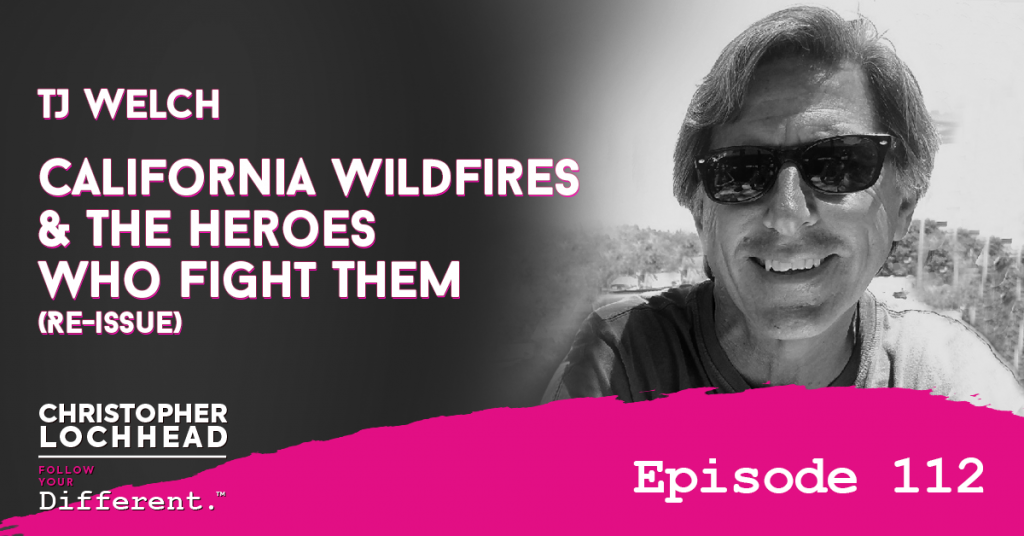
Podcast: Play in new window | Download (Duration: 1:04:17 — 59.2MB) | Embed
Subscribe: Apple Podcasts | Spotify | Pandora | RSS | More
As California is suffering another horrible season of wildfires, we thought it would be powerful to give you some inspiring insight into how heroes fight these massive fires. On this special reissue episode, Retired Battalion Chief TJ Welch gives us an insider’s view of how thousands of Firefighters and first responders spring into action in a matter of hours to save lives and property.
TJ Welch – Starting Out in the City
TJ spent the first years of his career dealing with brush fires and structural fires. He also had his fair share of wildland fires as a chief officer. But he and other city firefighters pretty much only stood guard in front of the houses.
It wasn’t until the late ‘90s when they made full use of city firefighters. They went to timber and brush areas to stop fires and perform other operations.
“This was my moment where it kind of changed my perspective of my role as a chief officer.” – TJ Welch
Wildland Fire in Numbers
Back in the day, the biggest of wildland fires reached up to 160 thousand acres, which is equal to the same number of football fields. This number has been expanding in recent years, reaching up to 200 thousand acres of wildland catching fire.
The terrifying numbers make sense when taken in the context of the number of residences, the timber that is involved, how exposed the wood is, and how quickly it burns. These wildland fires burn a couple of football fields per second. They are impossible to outrun and risk many lives.
There’s a lot of reasons as to why wildland fires catch so quickly. On the other hand, timber could take a while to dry and get moisture back. With the drought that has gone on for so many years along with other forest products left out in the open, the wildland fires have become more gigantic.
A Turning Point
There was one fire that forever changed TJ. This gave way to a collective effort to train firefighters in the art of effective mobilization when tempering these massive fires.
“When I left that fire, I said I’m not gonna be so ignorant when I come to another wildland fire.” – TJ Welch
To hear more about how California firefighters move as a unit and how TJ Welch dealt with the massive responsibility of being a leader, download and listen to the episode.
Bio:
TJ Welch is a 32 year veteran of the fire service.
Throughout the course of his career, he served in volunteer, industrial and municipal fire departments.
TJ was a member of CAL Fire ICT 3 from 1997-2005 and a founding member of CICCS. He was a qualified Type OSC2, OPBD, DIVS, and STEN.
TJ retired in 2014 as Battalion Chief with Alameda County Fire Department.
He currently teaches and writes Officer courses for OSFM, and is a Firefighter Safety Specialist for California Department of Public Health and NIOSH where he investigates firefighter line of duty deaths.
Links:
How to donate to victims of Fires in California:
How To Help Victims Of California Wildfires As Tens Of Thousands Are Forced To Flee Homes
Supplying Aid To Victims Of Emergency (Save)
California Community Foundation: Wildfire Relief Fund
We hope you enjoyed this episode of Follow Your Different™! Christopher loves hearing from his listeners. Feel free to email him, connect on Facebook, Twitter, Instagram and subscribe on iTunes! Get amazing, different stories on business, marketing, and life. Subscribe to our newsletter The Difference.
090 The Green “Circular Economy” w/ #1 Amazon Bestselling Author Heather Clancy
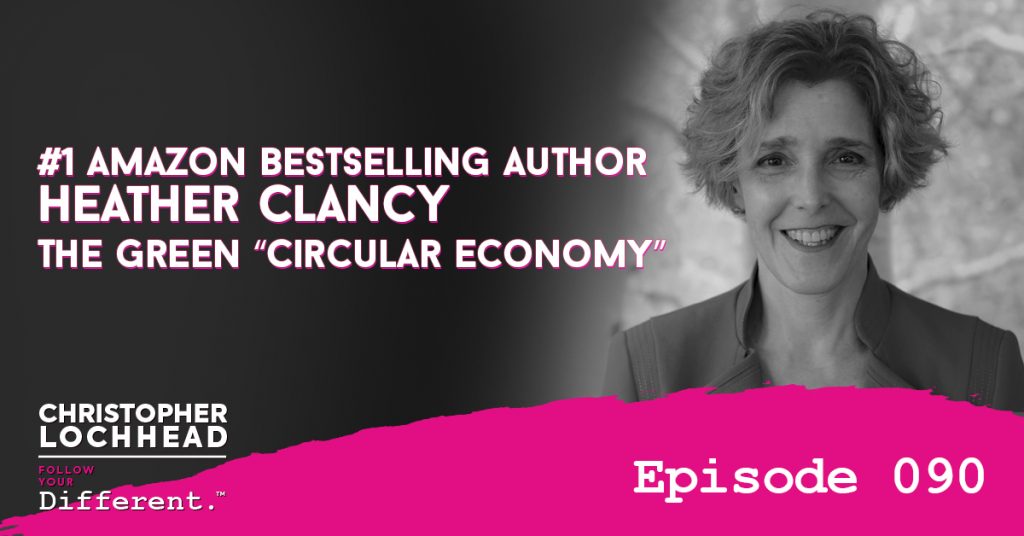
Podcast: Play in new window | Download (Duration: 1:10:08 — 64.4MB) | Embed
Subscribe: Apple Podcasts | Spotify | Pandora | RSS | More
Today, Amazon-best-selling author Heather Clancy gives us insights about a very timely topic — the green economy. We talk about what she’s learning about the green economy, the controversy around carbon taxes and how companies are creating new offerings centered on sustainability.
The Sustainability Journalist
Heather is the editorial director of GreenBiz.com. She is an award-winning journalist who covers transformative technology for business readers. Media outfits such as Entrepreneur, Fortune, The International Herald Tribune and The New York Times have featured her articles.
She discusses with Christopher the concept of circular economy and how major corporations have played a major role in its growth and acceptance among consumers.
“For many individuals, there’s a lot of different reasons for this, the idea of the circular economy is ‘something can be reused in someways.’ Not necessarily recycled, but potentially remanufactured.” – Heather Clancy
The Circular Economy
Heather shares some of the efforts of major corporations to address sustainability issues in the market. A recent company called The Real Real raised 300M in their last week’s IPO. It is one indication that the circular economy is on the rise.
Moreover, she shared about the company Loop, formed by Terracycle, which offers common household products in reusable packaging.
“The idea behind Loop is: big consumer brands like Procter & Gamble and Unilever, should be thinking about reusable containers. They are now designing packaging using aluminum or glass, which you think about as old packaging, but they’re kinda beautiful.” – Heather Clancy
This effort of Terracyle challenges packaging designers to offer consumers a different kind of product, one that still creates brand affinity. Additionally, Heather thinks that this switch from single-use plastic to reusable packaging would be a good talking point for PR.
Are all the efforts worth it?
Loop partnered with grocery store Walgreens and drugstore Kroger as drop-off points for the empty reusable packaging. UPS then collects the empty bottles for the refill and redelivers them to the customers. With this supply-chain set-up, Christopher posed a very important question: are all efforts worth it?
We are very much aware of the carbon emissions for transporting these goods. Likewise, Christopher also mentioned an article about Tesla and how “unsustainable” it is. The cost of manufacturing one car is alarming, in terms of carbon emissions.
“I don’t have an impact statement for you there, but the companies who are making them, are basically giving a 2nd life to them.” – Heather Clancy
To hear more about the green “circular economy” w/ #1 amazon bestselling author, Heather Clancy, download and listen to the episode.
Bio:
Heather Clancy is a veteran journalist working at the intersection of information technology, entrepreneurship, and green technology.
Heather is the Co-author of #1 Amazon bestseller, Niche Down: How To Become Legendary By Being Different.
Heather’s articles have appeared in Entrepreneur, Fortune, The International Herald Tribune and The New York Times.
She is the editorial director for GreenBiz.com, and the launch editor of FORTUNE Data Sheet, a daily dose of enterprise technology news.
Links:
The Real Real: Luxury Consignment Sales
Terracycle – Closed Loop Solutions
Wired.com – Teslas Electric Cars Might Not Be As Green As You Think
We hope you enjoyed this episode of Follow Your Different™! Christopher loves hearing from his listeners. Feel free to email him, connect on Facebook, Twitter, Instagram and subscribe on iTunes!
071 How to design a company that people are lining up to work for
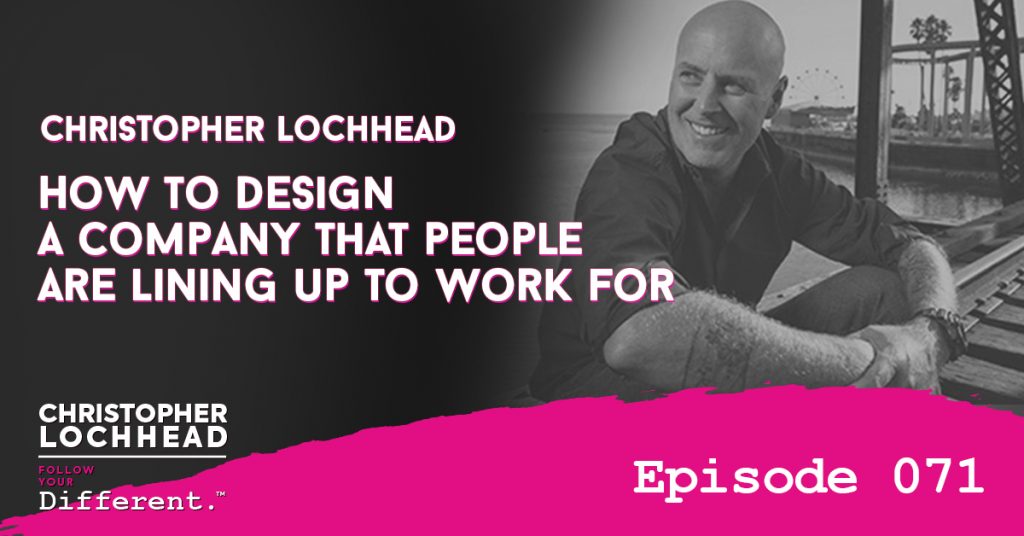
Podcast: Play in new window | Download (Duration: 14:17 — 13.1MB) | Embed
Subscribe: Apple Podcasts | Spotify | Pandora | RSS | More
Inspired by his conversation with Bob Evans at Cloud Wars Live, Christopher Lochhead talks about radical ideas involving employee happiness, growth, and satisfaction as key determinants in designing a company that people are lining up to work for.
Americans are Unhappy at Work
Christopher shares the alarming truth of today’s workforce: Americans are unhappy with their jobs. In fact, in episode 056, guest Jim Harter discussed the rapid decline in the rate of productivity at work. Thirty-four percent (34%) of the 37.2 million American respondents surveyed said that they were not engaged.
“If most employees say they are not engaged, and most managers say they are not engaged, then there’s something off with the typical work environment—what most people would call culture.” – Christopher Lochhead
Algebra of Happiness
In episode 052, Professor Scott Galloway related how happiness can be plotted as a graph.
A person’s happiness level starts relatively high until it slowly declines in a phase called “shit gets real stage.” Contributors to these low levels may include raising children, financial instability and crazy work life. After the dip, it goes up over time as a person reaches age 45 to 55.
Amazing Culture at CutCo
Listeners might remember from episode 044, Dan Casetta and his amazing culture at Cutco. Inexperienced high school graduates and working students make up his workforce. The company runs by its mantra, “changing lives while selling knives” and it has been successful with its recruitment, training, and inculturation.
The Takeaway
How do these ideas intersect? The vast majority of people felt disengaged at work. However, this is not the case at Cutco. Christopher acknowledges the industries today have a cultural, engagement problem.
“If part of creating jobs is creating an environment for them to become fully self-actualized, then most companies are dramatically failing.” – Christopher Lochhead
If companies would only infuse into their culture the mentality of personality development—where they teach employees life skills, career skills, sales skills, and relationship skills—then people would definitely be lining up to work for them.
Christopher poses two points to ponder. First, could we change the level of engagement? Second, can we actually, meaningfully increase the amount of happiness the people have during the core part of their career?
To hear more about Christopher’s take on designing a company that people are lining up to work for, download and listen to the episode. Got a question for Christopher? Email him at bl*******@******ad.com.
Link:
Book-It’s The Manager by Jim Harter
*******@******ad.com. Link: Book – It’s The Manager by Jim Harter Episode 056 – Jim Harter Episode 052 – Professor Scott Galloway Episode 044 – Dan Casetta We hope you enjoyed this episode of Follow Your Different™! Christopher loves hearing from his listeners. Feel free to email him, connect on Facebook, Twitter, Instagram and subscribe on iTunes!”> Jim Harter – *********@******ad.com.%20%20Link:%20%20Book%20-%20It%E2%80%99s%20The%20Manager%20by%20Jim%20Harter%20%20Episode%20056%20-%20Jim%20Harter%20%20Episode%20052%20-%20Professor%20Scott%20Galloway%20%20Episode%20044%20-%20Dan%20Casetta%20%20We%20hope%20you%20enjoyed%20this%20episode%20of%20Follow%20Your%20Different%E2%84%A2!%20Christopher%20loves%20hearing%20from%20his%20listeners.%20Feel%20free%20to%C2%A0email%C2%A0him,%20connect%20on%C2%A0Facebook,%C2%A0Twitter,%C2%A0Instagram%C2%A0and%20subscribe%20on%C2%A0iTunes!”>Episode 056
Professor Scott Galloway – Episode 052
We hope you enjoyed this episode of Follow Your Different™! Christopher loves hearing from his listeners. Feel free to email him, connect on Facebook, Twitter, Instagram and subscribe on iTunes!

